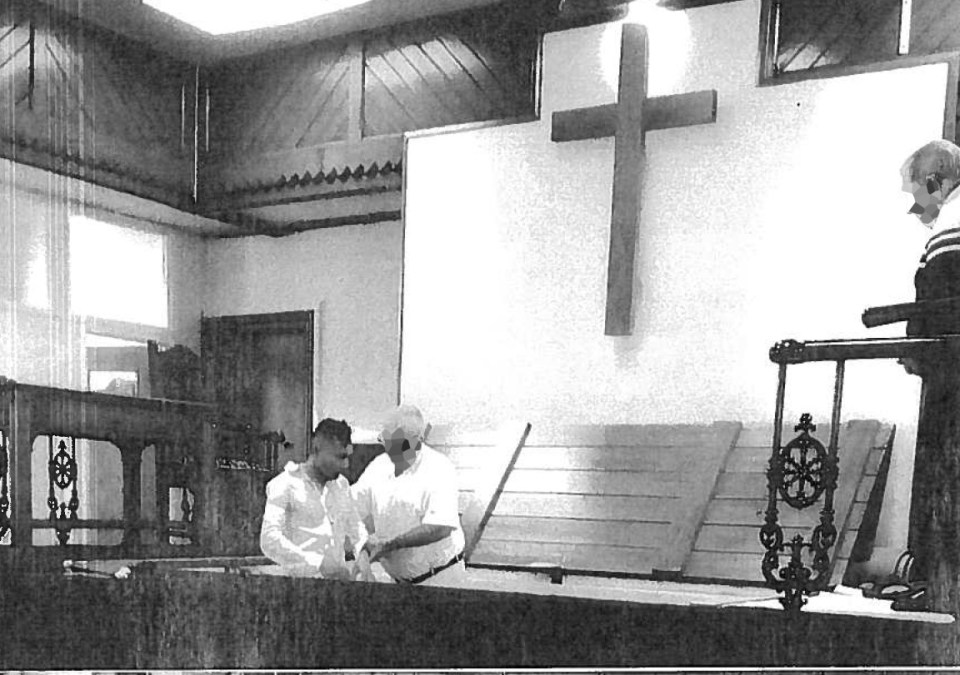CHEMICAL attacker Abdul Ezedi was given a Muslim funeral despite claiming he was Christian so a church would back his asylum bid.
Questions are mounting over how the 35-year-old Afghan national was allowed to stay in the UK despite being a convicted sex offender.
Ezedi had twice been refused asylum by the Home Office but a judge eventually accepted he was a Christian convert - despite him failing to correctly answer basic questions about the religion.
He went on to become the subject of a huge manhunt after allegedly pouring chemicals on his ex and her children in Clapham, south London.
Footage has now emerged of Ezedi being given a Muslim burial despite his Christianity claims after his body was pulled from the River Thames last month.
It is understood his funeral was held at a mosque in West London on March 11.
Read more on the case
Ezedi was then buried in a cemetery in East London at the request of his friends and family, the reports.
The mosque, which Ezedi was reportedly not known to, is understood to frequently conduct funerals and burials for asylum seekers who die alone.
Court documents released yesterday have revealed a key factor in him being granted asylum was a baptism at Grange Road Baptist Church in Jarrow, South Tyneside in 2018.
The previously-sealed papers also showed the decision came despite Ezedi failing to answer basic Home Office questions about Christianity.
Most read in The Sun
This included him wrongly claiming the Old Testament was about Jesus Christ and that one of the Apostles was called Jacob.
Asked what God created on the third day, Ezedi answered: “Good Friday and Easter Sunday and Resurrection Day.”
Home Office officials told a tribunal they believed Ezedi was hiding behind the religion "for his own ends".
But the immigration judge pointed out that despite some lies in his claim, this did not “automatically mean that his evidence in relation to his claimed conversion could not be believed”.
He overturned the Home Office's decision not to grant him leave to remain on asylum and human rights grounds.
The ruling in November 2020 also claimed Ezedi had “undergone a genuine conversion from his former Muslim faith to Christianity” and that he would be at risk if he returned to Afghanistan.
Judge William O’Hanlon highlighted a character reference from Reverend Roy Merrin, former ministry team leader at Grange Road Baptist Church, as "the most compelling evidence".
The Reverend had told the court he did not consider Ezedi someone who "fraudulently claimed conversion with ulterior motives in relation to asylum".
Papers also show some supporters were aware of his crimes - making Ezedi sign an agreement that would effectively see him escorted during church services to protect parishioners.
The Afghan arrived in the UK in January 2016 but his initial asylum claim - and a further bid the following year - were rejected by the Home Office.
In 2018, Ezedi was handed a suspended sentence at Newcastle Crown Court after he admitted sexual assault and exposure.
How Abdul Ezedi evaded cops after Clapham attack

THE suspected chemical attacker injured 12 people in Clapham, south west London, in January.
Among the victims was his ex-girlfriend, who had been lured into meeting Ezedi.
He is then alleged to have attacked her and her daughters, aged three and eight, in their car.
Police said previously there was a "very strong indication" the pair were in a relationship, which had since "broken down".
The fugitive's details were shared with all UK police forces and ports and a £20,000 reward was offered for information leading to his capture.
Officers believed Ezedi had jumped into the water after he was last seen pacing up and down on Chelsea Bridge.
His body was pulled from the Thames on February 19 after 20 days on the run.
He was placed on the sex offenders' register for ten years and ordered to carry out 200 hours of unpaid work.
A year later, Ezedi launched a challenge against his asylum claim with the First-tier Tribunal's Immigration and Asylum Chamber.
This was granted and the appeal took place in November 2020 despite concerns over whether his conversion was "genuine".
A Home Office spokesperson said: "All asylum claims are carefully considered on their individual merits in accordance with the Immigration Rules. This means that religious conversions do not guarantee a grant of asylum.
Read More on The Sun
"We have engaged with a wide range of stakeholders to help us to improve our policy guidance, training for asylum decision-makers, and to ensure we approach claims involving religious conversion in the appropriate way."




















